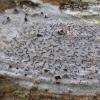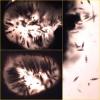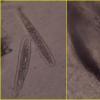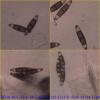
02-02-2026 21:46
Margot en Geert VullingsOn a barkless poplar branch, we found hairy discs

02-02-2026 14:55
 Andgelo Mombert
Andgelo Mombert
Bonjour,Sur thalle de Lobaria pulmonaria.Conidiome

02-02-2026 14:33
 Andgelo Mombert
Andgelo Mombert
Bonjour,Sur le thalle de Peltigera praetextata, ne

31-01-2026 10:22
 Michel Hairaud
Michel Hairaud
Bonjour, Cette hypocreale parasite en nombre les

02-02-2026 09:29
 Bernard CLESSE
Bernard CLESSE
Bonjour à toutes et tous,Pour cette récolte de 2

01-02-2026 19:29
 Nicolas Suberbielle
Nicolas Suberbielle
Bonjour, Marie-Rose D'Angelo (Société Mycologiq

31-01-2026 09:17
 Marc Detollenaere
Marc Detollenaere
Dear Forum,On decorticated wood of Castanea,I foun

29-08-2025 05:16
 Francois Guay
Francois Guay
I think I may have found the teleomorph of Dendros

30-01-2026 21:20
Arnold BüschlenBryocentria brongniartii und B. metzgeriae mit ihr
I would like to have more opinions about this asco, that was growing on the thallus of a lichen (of the genus Graphis), as can be observed from the first photo attached. In addition there was another parasite with similar appearance over the lichen. I was doing the microscopy of the lichen and noticed some stranges spores. Then I selected a emerging volcano and made some sections of it. From the shape of the ascospores I immediatly thought that could be a Hysterium sp.. When I measured the spores I got a surprise, the size was about the double than expected (in average 52.4 x 12.8 µm). I went to the key of Eric Boehm, available at
http://www.eboehm.com/hysterium.html
and arrived to Hysterium macrosporum. Since till now I found only two Hysterium species: H. angustatum and H. pulicarea and, according to the description given in the above website, H. macrosporum it is a very rare species, I became doubtful. Is there any other suggestion?
Thank you in advance,
zaca
Hi Zaca,
H. macrosporum is not possible because ascospores are 2-coloured.
It's close to H. pulicare but different, to my mind. But there are a big variations in H. pulicare (for example, H. pulicare Pers. and H. truncatulum, one of its synonyme) and study would be necessary.
My opinion is that your fungus is probably an ined. fungus.
Alain
PS just a question : ascopores are in water in fourth picture ?
Ragarding your question the answer is: YES. All the observation was done with water.
Regards,
zaca




